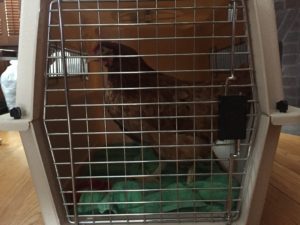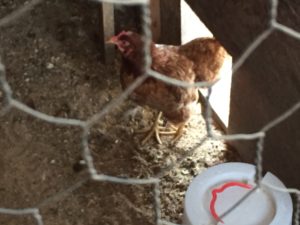As you may recall, we lost a hen last spring to what was likely a case of egg yolk peritonitis (EYP). EYP is when the egg does not form properly inside the hen and then the yolk can remain inside the hen and cause an internal infection. EYP is almost always fatal.
A few weeks ago, another of our hens, Mindy, was exhibiting similar symptoms. She was somewhat more lethargic than normal and she was also walking upright like a penguin. We recognized the symptoms from our prior experience. We separated her from the flock.
After last time, we had asked around the area and had been given the names of several local vets who are willing to see chickens. We packed her up in a travel dog crate and took her to the vet at their first open slot.
Not surprisingly, in the waiting room, we were the only one with a chicken instead of a dog or cat.
After meeting with the vet, the situation was not looking great. Mindy’s abdomen was enlarged and somewhat solid to the touch. The vet could not provide a specific diagnosis and there were a number of possibilities, most of them were very likely to be fatal.
Mindy’s only realistic chance was exploratory surgery. The vet could not provide any likelihood for success because there are very few chicken surgeries (the cost of a chicken is so low compared to the cost of surgery that few people ever take chickens to a vet at all, let alone for a surgery). We opted for the surgery.
Her surgery was the next morning. Click through to see how it turned out.
She made it! The surgery took a couple of hours. The vet removed over 5 egg yolks worth of material from her abdomen (she lost over 25% of her pre-surgery weight). Her reproductive system had malfunctioned and she was not forming eggs properly and the eggs were not forming shells and ended up stuck inside her. Fortunately, we had caught it in time and the vet was able to remove the yolk material before it became infected, giving her a good chance at survival. The vet had to remove most of her reproductive system during the surgery so there is very little chance of a recurrence, although she won’t give us any more eggs.
We were able to pick her up from the vet that afternoon. She was technically cleared to go back out to the coop, but, she needed to take antibiotics twice a day for 10 days to ward off infection and we also needed to keep the incision clean and dry until it healed. Catching her twice a day to get her her pills plus keeping her clean and dry during the snowy winter would have been difficult at best. We decided to keep her inside during her recovery. We set up a pen inside the house.
Here are some photos and videos of Mindy in her pen inside the house the first couple of days after surgery.
It was a struggle to get her to take her pills. We were given a tool that was designed to push the pill down her throat, but it was hard to get it into place, especially after the first days once she was expecting it and once she was feeling better and fighting against it.
The easy pill solution for chickens – blueberries! Simply push the pill into a blueberry and then she happily eats the blueberries whole without any struggle.
After 10 days, she needed to go back to vet to check in and have her stitches removed. We put her back in the travel crate and drove back to the vet. The vet mentioned that she was looking good.
She was finally ready to head back to her flock.
She was excited to get out of the crate and back into the coop.
However, it seemed like during her absence from the coop for over a week, she had lost her place in the pecking order and she had to re-establish her social standing.
Here is a video shortly after her return where one of the white hens is pecking at Mindy.
Because we weren’t 100% sure Mindy could handle herself with the other hens yet, we decided to bring her back inside and try again at nighttime. That night, we put her back into the coop on the roost bars when they were all mostly asleep. After a few minutes of jostling with each other, the hens settled in for the night.
Mindy is still doing well and seems to be fully recovered.
A big thanks to Dr. Spindel at Animal Ark for their help.




How much did the surgery cost?
The surgery cost a lot more than the price of a chicken and likely enough to buy all the eggs you could eat for at least a couple years (even if they were organic, free-range eggs!).
It required special small surgical tools for operating on birds. It also requires detailed knowledge of bird anatomy, which is not that common among vets.
Happy for Mindy (also the name of a colleague of mine at work)! Oh, is that why you go back to NYC every once in a while, to re-establish the pecking order?
Yep – exactly.